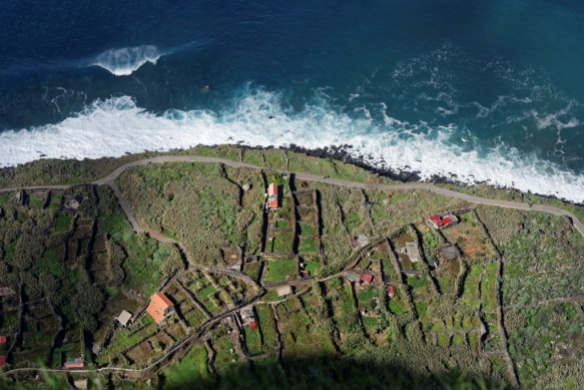Tag: writing
History’s Loop 3
“The danger was all the candles. I’d set some on the back of the toilet and on the edge of the tub so people could see to use the facilities. And we placed an old candelabra in the living room. Lynn bent over it and just about lit her bangs on fire. After that just grownups were allowed to go near any candles or handle the lanterns or grill. Responsible adults only.” Her eyes focus far in the past.
“But it was like a party.” Keith contributes, “We were all together. The Robinsons were our best friends and our kids were all roughly the same ages and in the same grades and played together. If this was the end of the world, I was glad the kids were safe and well fed, I’d just eaten a great steak, and I was with the people I care for most. Although if I’m honest, if I remember right that steak had freezer burn. And it was cold outside; it was November. But I remember it this way, the best meal and one of the best nights of my life. Isn’t that funny?”
“Funny….” Sue’s voice trails off.
I don’t know if she considers it funny ha-ha or funny terrible. Maybe both. Cass and Jolie have finished their meals and sit. Their eyes move in their faces as they follow our conversation.
“We didn’t talk about what was happening. It’s not that it happened fast; just the opposite. It was all so gradual. Information kind of trickled out.”
Our own meals arrive, and they fall silent. The waiter leaves, Timber and I start to eat, and only then do they return to the story.
“On the drive home from work,” Keith continues, “I listened to the radio. And while no one reported it as a possible attack, I know that’s what I suspected. I was going to keep that to myself and not worry my family. But when I walked in the house I took one look at Sue’s face and knew that she was thinking the exact same thing. But all she asked was, ‘The city too?’ and before I could do anything more than nod a yes the kids burst through the door to tell me all about the lights in the whole neighborhood going out. We just kind of looked at one another over their heads and it was parents’ mental telepathy, as parents we were going to guarantee their last night on Earth was, like Lynn kept saying about the house being lit up with candles, ‘magic’. And, Jeff.” Keith takes a big swallow of water and resumes in a low pitch.
Timber leans forward to hear.
“He wanted to help. Together we filled a bunch of gallon jugs and pitchers with water. Then the sinks and the bathtub. Later when all the kids had gone to bed we sat with Jerry and Irene and had a night cap. They left and went back next door.”
“’I want to check on the kids,’ Jerry told you,” recalls Sue. “That night was the first time I thought of him as a good dad. Irene always had to haul him home once the two of you got going drinking beer or shooting the breeze out back.”
“Beer drinking doesn’t make someone a bad parent. But yeah, he liked his booze. A twenty-year old Scotch on the last night on earth isn’t a bad thing.”
Sue turns to the girls. “Cass, you referred earlier to Nine-Eleven. In 1965, the scariest thing was the not knowing. Nine-Eleven was a different story. With that one it was clear pretty quick who the enemy was. We used that information as an excuse to act out our lowest common denominators.”
Cass tenses. “Gram, you don’t really think that, do you?” It’s not a question; it’s a plea.
Timber, Sue, Keith and I exchange glances. Keith and Sue sit up a little straighter. “Never get old people rambling about the past,” Sue smiles at her granddaughter, asking forgiveness. “My story happened half a century ago, and kind of feels like more than a world away from what’s going on now. But it’s the same historic loop: humans scared this time we’ve blown it. But,” she folds the pleat in her cloth napkin, running an arthritic index finger along its seam, “maybe not. We’ll pull through. And the important thing is to be with the people you care about.”
“If you’ll excuse me.” Timber pushes his chair back and heads for the restrooms at the back of the restaurant.
© Jadi Campbell 2016. From Grounded. Go to following link to order my books: https://www.amazon.com/author/jadicampbell
History’s Loop 2
Cass is eating too, but she pauses and frowns. “You mean Nine-Eleven when I was little?”
Her question reminds me of how I’d stumbled around an explanation about what happened with my daughters.
“No,” Keith shakes his head at her, “way earlier. Way before all your times. In the 1960s, there was a total black out on the East coast. No one knew what’d caused it. Information didn’t get out as fast. No computers, and no Internet.”
“It was 1965,” Sue states. “November. We were living in Connecticut. We’d just moved into this little ranch house, kind of a fifties bungalow, not quite a row house. A starter home, they called them. I loved our little house!” She beams with pleasure and places a hand on Keith’s for a second.
He smiles as he enjoys his sole.
“It had three bedrooms so the kids each got to have their own room, and a long back yard. Keith hung a hammock out there and we had a picnic table and a grill.”
Both eat as they reminisce. “The kids were little. They were outdoors with friends, playing.”
“Lynn and Jeffrey were, what, six and ten years old? Something like that.”
Sue nods. “I went to start dinner and the lights in the kitchen were out. The refrigerator light, too. I figured a power outage. Then our neighbor Irene Robinson knocked on the door; they had the same problem. So the two of us stood on the stoop trying to understand what had happened. It was getting dark and I was about to call the kids in when Irene said, ‘Shouldn’t the street lights be on by now?’ She was right; the streets were dark in any direction as far as I could look. Everything was.
“We realized it must be a blackout. I called the kids in to get ready for dinner. I figured I’d have Keith fire up the grill.”
Keith speaks up. “Lynn and Jeffrey would’ve eaten grilled hamburgers and hotdogs every night if they could.”
“And corn on the cob,” Sue adds.
I’m already nodding in agreement with both statements. My three kids are wild about meals outdoors on the picnic table. Louie prefers a good pork sausage to a hotdog, but he’ll eat a burger any chance he gets.
“My Petey, too,” Timber chimes in. He presses his foot against mine under the table and gives me a special smile. My stomach flutters and I smile back, our conversation in the car forgiven.
“Us too!” Jolie and Cass contribute.
Three generations represented by four adults and two almost adults in a fancy seafood restaurant agree: all children love summer meals.
“So there we were,” Sue resumes. “My freezer thawing as I stood and watched. Keith and I had a confab and decided we’d do a smorgasbord. Cook everything. To throw out perfectly good food isn’t just wasteful. It would have been sinful. Back then, people were frugal.”
“Of course, in the ‘sixties people worried more about food going bad. Stuff didn’t have shelf lives like they do today! Except Twinkies,” Keith adds.
His wife doesn’t miss a beat. “Hey. Don’t knock my emergency go-to snack in those days. Moms need one thing that never gets stale! So Keith starts the grill. I seem to remember there was a full moon that night…. I made an inventory of what we had to cook. About the same time Irene was back at the door. The Robinsons had the same idea. How about we combine meals? I’d been saving two T-bone steaks for special. God knows when I thought that evening was going to arrive. Anyway, the adults split them while the six kids ate burgers and hot dogs. Irene had giant turkey drum sticks and we rigged an aluminum packet with those and a can of tomatoes. Remember, Keith?”
“Yeah. It was messy.” His eyes are soft as he recalls a meal eaten more than half a century past.
Both old folks are silent for a minute as they relive the evening.
Timber and I are silent too. I relax into their memory.
Cass seems fascinated too. “You never told this story before, Gram. Neither has Mom. Did she understand there’d been a blackout?”
“I never explained. We never talked about it, not that night and not after.” Sue stares down at her meal and I’m shocked at how haggard her face grows. “That night I thought, This is it. The world’s coming to an end. Russia had invaded. Or Martians; didn’t matter which. When electricity on the eastern seaboard went out, it had to be a foreign attack. And if my government hadn’t been able to prevent that, I’d better get ready for the end. I was grateful to be with my family.” She’s somber, softer. “I knew I’d shield my children as long as possible. I told them the TV and radio weren’t working, and how about we treat it like an early Night before Christmas? It seemed that quiet to me, the full moon outside, the glow of coals in the grill out where Keith and the six kids were making s’mores.” Sadly, Sue adds, “Our son died in a car accident a few years later. That was still ahead of us.”
© Jadi Campbell 2016. From Grounded. Go to following link to order my books: https://www.amazon.com/author/jadicampbell
History’s Loop 1
We order clam chowders, avocado halves filled with shrimp, sole with crab meat, and scallops sautéed with leeks and tomatoes. Another glass of white wine for me, a third local beer for Timber. Alcohol seems to have little effect no matter how much we drink. And I was never a drinker before.
Before. Back in the days when I was a faithful wife and knew where my kids were at all times. Back when the world was one I could recognize.
“Cheers.” My smile wobbles as we toast one another.
We’re diverted by laughter from the next table. An old woman leans over and kisses her husband’s cheek. She gives us a sunny smile. “I couldn’t help overhearing you order. You picked all our favorite dishes.”
“Oh, Grammy.” The tawny-haired young female who says this and rolls her eyes is improbably beautiful. She has the flawless skin and glossy sheen of someone with her whole life ahead of her. She’s nineteen, twenty maybe, tops, just a few years older than Theresa. She sits across the table from her grandparents next to a friend, who nudges her with a grin.
The young women slurp drinks in globe glasses through straws as they stare at us. I watch, amused beyond words, as they check us out. I can almost hear the category click into place: Our parents’ age group, probably parents themselves. The guy she’s with is cute though – for an old guy.
I’m grateful for the youth at the next table. That’s the thing with a catastrophe: you want your children to carry on, no matter what happens to you. I have a Crosby, Still, Nash and Young album, with a song called ‘Teach Your Children’. Its tender lyrics about how you on the road should teach your children well are suddenly, acutely visionary.
“…Keith James; this is my wife Sue. And this is Cass and her friend Joley. Cass always stays with us in August.”
I come back to the present as the strangers introduce themselves. “Joley and I are starting nursing school and Gram told us, if we want to specialize in geriatrics start with them. Grandpa got his other hip replaced so it’s good we’re here. But I’d come anyways. I love summer in Ocean Beaches.” Their granddaughter in the summer print dress and sandals speaks politely, but she and her friend keep staring.
“I’m Glen, and this is Nicole. Nice to meet you.” Timber’s eager to talk, seeking an antidote to the grim calculations we just heard in the bar. “We had the best afternoon!” he offers. “We went to the beach.”
The two girls burst into laughter and for some reason it sounds familiar. For the first time the granddaughter’s friend speaks. “We were like, jogging, and saw someone who was like, almost bare, fighting a dog for her clothes. And, you,” she turns and looks at Timber and her eyes go glassy in admiration. “You did this amazing series of back flips and took off most of your clothes too! When we saw you come in the restaurant I knew that for sure it had to be you!”
With relish Timber and the girls tell Keith and Sue about the incident. I’m too embarrassed to do anything except nod. At the end of the telling everyone laughs and I join in.
Timber gives the two young women a smile that makes their cheeks flush like a blush wine.
Cass’s grandfather offers, “We’re on a budget, but we go out to dinner once a week no matter what. Thursdays, you’ll find us right here. It’s not just, um, old people’s force of habit. Or maybe it is…”
“Are you from here?”
“We moved here decades ago. We love the coast,” Sue answers. “Our daughter talked us into it. Lynn (Cass’s mom), and her family live in Corvallis. We’re glad to have Cass and Joley with us.”
Keith says, “Lynn’s anxious, but we’re fine. We keep telling her, Ocean Beaches just might be the safest place in the country right now. And if not, then not. Life goes on, and Thursday means dinner at The Sea Shore.”
“How can you be so calm with the world exploding?” It blurts out before I can prevent it. I go red, embarrassed and sorry to have ruined the relaxed conversation. I can’t seem to stop asking my desperate question of everyone we meet today.
I’m saved by the arrival of a waiter. He sets down two plates each of sole and scallops and in spite of myself I laugh.
“Okay, so it is force of habit.…” Keith picks up his silverware and prepares to dig in.
“Truth in advertising!” I tease.
“The scallops? They’re the best,” Joley declares. She widens her eyes and gulps more of her drink.
“By the way,” Keith says. “Your question? This isn’t the first time we were afraid maybe the world was ending.”
© Jadi Campbell 2016. From Grounded. Go to following link to order my books: https://www.amazon.com/author/jadicampbell
Holiday Insurance 1
It was quiet at the animal shelter and I left early. I showed up for my husband’s insurance company’s party after all. A garland hung over the front partition. Lights reflected off strands of silver and gold glitter a secretary had hung around a Christmas tree in careful rows. Somewhere on the floor people were singing an off-color version of Deck the Halls.
I checked Rich’s office, but it was locked. When I got back to the front Miranda, the department coordinator, was at her desk. She bent over, tugging at the stockings she wore under a plaid winter jumper.
“You’re here!” Miranda exclaimed. She recovered quickly. “Hi, Nicole. Rich wasn’t sure if you were coming.” Something in the words was stiff, but Miranda and I had never hit it off.
“Is he around?”
“Everyone just headed for the conference room.”
“Thanks, Miranda.” I walked away before she could pretend to engage me in friendly conversation.
The conference room was filled with staff and their significant others, helping themselves to catered food. Rich and the sales reps stood together. Each was twenty pounds overweight and hungry for a deal. All carried cell phones. They formed a modern day, electronic posse at the OK Corral.
Rich waved his arms for the group to quiet down, his face flushed. “Someone told me a new one yesterday.”
I’d been about to make my presence known, but my husband tells a great joke. “One fine weekend in August Sherlock Holmes and Doctor Watson went camping,” Rich began. “They found a remote spot in a clearing in the woods. The two set up their tent and fell asleep. Some hours later, Holmes woke his faithful friend.
“‘Watson,’ Sherlock Holmes spoke urgently. ‘Look up at the sky and describe what you see.’
“Watson obediently stared up into the skies. ‘I see millions of stars.’
“‘What do they tell you?’ Holmes asked.
“As usual, his companion was setting a puzzle to be solved. Watson pondered. ‘Their light tells me there are millions of galaxies and potentially billions of planets beyond what I can count. According to the constellations, Jupiter is in Leo. The warm air and the trees’ full foliage indicate late summer. From where the moon is over there on the horizon, time-wise it appears to be a quarter to three. I can see the Milky Way. It follows that tomorrow will be a beautiful day without clouds or rain.We’re in the middle of the wilderness, so it’s evident we are small and insignificant, but safe in the Lord’s hands. What do the stars tell you, Holmes?’
“The great detective was silent for a moment. ‘Watson, you fool, someone’s stolen our tent.'”
The conference room burst into laughter.
“That one’s for my wife Nick, who thinks I shouldn’t be allowed anywhere near a camp site,” Rich began, and I stepped forward. “Hey! Speak of the devil and she arrives! When did you get here?” My husband put an arm around me and gave me a kiss. It was more than just a display of good will for his colleagues; Rich was genuinely happy to see me. “Look at you!” he exclaimed.
I wore a brocade jacket over a white blouse and narrow black skirt. “I changed before I left the shelter.”
“Babe, you look great. I always tell you, you should dress in skirts more often.”
I opened my mouth to retort that I do wear them, as often as time and place allow. He flushed more deeply.
I walked to the window. Slow traffic crawled along the streets outside the office. Gray snow sprayed from under tires, sludge like my attempt at holiday enthusiasm. We’d had a short thaw, but then the softened snow turned to dangerous black ice.
“While I’m at it, can I get anyone another?” Rich asked the room. How many drinks had Rich had? Later that evening we planned to head to my parents’ house for a family get-together. His hand touched my elbow. “Babe,” he began.
I gave him a wide smile, pretending I didn’t see his guilty expression. “How ‘bout a drink for the spousal unit?”
Rich’s face smoothed out as he realized I was passing on righteous indignation. “I was going to ask if you wanted a gin and tonic,” he lied. “Here – take mine.”
“If you can’t beat’em, join’em!” I brought the glass to my lips. I swallowed and almost choked. It was a double, no, it tasted like a triple. I finished off the drink and followed Rich over to the conference table. He mixed new drinks as he kept up a line of patter.
“Can I get another?”
Rich grinned and refilled my glass.

© Jadi Campbell 2016. From Grounded. Go to following link to order my books: https://www.amazon.com/author/jadicampbell
Gin and tonic image courtesy of dreamstime.com.
# 99 # 99 # 99 # 99 # 99 #
I always feel a little strange when I recognize it’s time to mark milestones and I have several to announce.
This is my 99th blog post.
I’ve posted in these virtual pages twice a month since I began way back in September of 2012. It all started with my husband’s suggestion that I establish an Internet presence….
My published books are fiction, and this blog serves as a good place to present excerpts. Potential readers of my books might want a sample of my writing and a glimpse of the human being behind the words. It’s also a place for non-fiction essays. I get to explore ideas and topics that don’t need to be transformed for novels. Posting every other week is great writerly discipline. I’ve never missed a bi-monthly posting date!
My topics bounce all over the place like gleeful ping pong balls. I’ve written about current events like The Death of Robin Williams, Helping Refugees: Part 1 and Tunisia Without Terrorism, to the World Cup in The Year the World Came to Party.
I occasionally write about historic events, too. Several are 8:15 A.M., Amsterdam, and Stolpersteine 1: Tsunami Cowboy’s Stumbling Stones.
I riff on artists in Meet the One-Tracks and art, like the sacred sublime in Cathédrale Notre-Dame de Chartres or sacred sexual in The Erotic Architecture of Khajuraho. I profile art made by human hands Wine and Sculpture, Wildly Creative in Upstate NY: The Ferros of Little York, Egypt 1: We had the entire Valley of the Kings to Ourselves or found in Nature: The Music of the Heavenly Spheres, Steamy Rotorua! and It Was a Bitterly Cold -22°.
Art can serve as reminders to bring us together, as in Stolpersteine 1: Tsunami Cowboy’s Stumbling Stones and The United Buddy Bears.
Of course, I write about writers: My Sister & Maurice Sendak and Baum, Bats, and Monkeys. I quote my beloved Shakespeare with Egypt 2: Along the Nile. Even Colleen McCullough gets a mention in The Outback!
And I write about writing itself: The Gift of Gab, Someone Burned My Book.
Food has been a topic: My Mother-In-Law’s Cookies, Despair Is An Exotic Ingredient, Adventures in China’s New Territories 3: The 100-Pound Fish, Deep Fried and Served with Sweet & Sour Sauce, The Fork is Mightier than the Sword. A Blog Post in Which I eat Paris, The Salt Pits and A Visit to the Food Bank, Part 1 & 2.
Holidays have been fun, from You Rang? (the worst/best Valentine’s Day in history) to Happy Halloween!
My day job is as massage therapist, and sometimes I write about healing and medicine. Helping Refugees: Part 1, Massage in Indonesia: Lombok, Adventures in China’s New Territories 4: The Gods of Medicine, A Massage at Wat Pho are a few of the posts.
…. and this all began simply as a way to introduce my two novels Tsunami Cowboys and Broken In: A Novel in Stories. Both are available at amazon.com in book and eBook form.
It’s been a fun journey these last three years! Thanks to all of you for visiting these pages. I wish everyone the happiest of holidays. I’ll be back in the new year with an announcement. Milestone #2 is on the way!!!
# 99 # 99 # 99 # 99 # 99 # 99 # 99 # 99 # 99
Someone Burned My Book
I’d been warned: the 5-Star reviews couldn’t last forever. “Be prepared,” people cautioned me. “Trolls are out there and sooner or later one of them will pan a book. It’s going to be ugly.” I don’t check for reviews on Amazon much as I take the long view. Writing a book is a slow process, and building up a list of reviews can take a while. I’ve been pleasantly surprised to receive consistently solid, glowing reviews.
Until now.
I got my first 1-Star review. The German guy says Tsunami Cowboys is the worst book he’d ever read. He didn’t finish it. And, after page 56, HE BURNED IT.
WTF? Really?? In the 21st century, people are still burning books?!?
I went into shock. I was horrified. Shaken. Ashamed, even. In my worst nightmares, I never ever ever imagined someone would actually destroy my words like this. Until now, it was beyond my powers of imagination.
I got out a copy of the book. What could possibly be so offensive? I opened to page 56 and the peak of a chapter in which Coreen, one of the main characters, is trapped in a cult and can’t get out.
Ok…. Maybe the troll was upset by the topic. I sure was; that’s why I wrote about it. If he’d made it to the end of the book he would have learned the following: I’m religious. I believe in God. My heroine’s story continues well past the page where he stopped reading.
If he’d bothered with the author’s Afterword, he’d have learned my personal reasons for even including this thread in my book.
I’m appalled that someone would be so hateful. I questioned everything I am doing as a writer, and worried about the consequences of exercising my voice. Then I remembered: I just went to a high school reunion. It was a fantastic weekend spent seeing wonderful people again. By far one of the most lovely is a woman who was a missionary.
She’s read both my novels. At the reunion, she made a point of telling me that the story of Coreen and the cult disconcerted her, and she had to put Tsunami Cowboys down for a while. It hit a little too close to home. But, she said, she picked it back up a few months later, read it to the end, and liked the story I told very much.
So that reassures me.
Words contain a lot of power, more than we realize. My encounter with the troll really brings that realization home to me, and in the future I will pay closer attention. His other reviews have the same ugly caustic tone, so I’m not alone. I’m not sure if that makes me feel better, or worse.
As my dear writer buddy Nancy Carroll remarked: “You’re now in good company, Jadi. Think of the books that have been burned through the ages.”
Indeed.
Think about them.
NOTES: [1] http://www.ala.org/bbooks/
http://uwm.edu/libraries/exhibits/burnedbooks/
[2] I swear it just came to my notice that this is Banned Books Week: September 27th – October 3rd.
Stolpersteine 1: Tsunami Cowboys’ Stumbling Stones
She placed her unbandaged left hand over his on the table top. “Don’t think I’m only a cynic. If I lost my faith in nations, I find huge bravery and kindness in individuals. I kept my faith – and how can that be, after what religion did to my country? But I did. I believe in God. You saved my life so I am saved again. It’s more than a woman could hope for.” She squeezed his hand. “How long do you stay in Stuttgart?”
For the first time his regret about leaving had to do with a person and not with his phobia. “I should take a train tomorrow. Actually, I’m scared to fly,” Guy admitted. “I was in a forced landing once. I’m afraid of being in another.”
“Why fear a statistic chance? Why worry about an abstraction?” Nadia’s shoulders rose and fell in the Eastern European’s shrug, a slow, weary movement that expressed the futility of every question. “Think about the poor people who are in tsunamis. Or a war zone, where real fear is to think, how do you keep walking on the street as a rocket hits somewhere near, or you hear thwack!, and the person in front of you falls down? First you think, this time it isn’t me. It took years for me to stop looking over my shoulder. Stuttgart is civilized, but even here I stumble over Stolpersteine.”
“Over what?”
“Stolpersteine.”
Guy shook his head. “Never heard of it.”
“Them. Come, I will show you. There are some up around the corner.” Nadia refused to explain further.
She insisted on paying the bill and tucked her arm in his as the two of them headed up the Königstrasse. She led him to a stop in front of a store. “What do you see?”
Guy saw Europeans out Christmas shopping, happy people laughing and drinking glühwein, store windows filled with beautifully displayed consumer goods. Was it something special about the storefront? He shifted his weight and his heel came down on an uneven spot in the cement. When he glanced down, Guy saw gold cubes embedded in the sidewalk. He squatted to get a better look. Königstrasse 60, a stone with the name of Clothilde Mannheimer, another beside it for Jakob Mannheimer.
Nadia crouched down next to him. “The Mannheimers lived in this building. They were moved by train to Theresienstadt and died in the concentration camp there,” she translated. “These are their Stolpersteine, their stumbling stones. Wherever we go, we stumble over reminders of the past. The stones make sure we don’t forget the dead, these make sure that people today can’t push the dead from our memories.”
Guy traced the imprint of the names. The little golden cubes were weightier than their size. “Are there more?”
“All over Germany. Other countries, too. The Stolpersteine groups wish to mark the last free place where the persons lived, not where they were sent. Sometimes a family asks for a stumbling block; sometimes a local group did research for victims. And Stolpersteine are for everyone. Especially the Jews, but also the Behinderte, the ones with handicaps,” she corrected herself, “the mentally slow or physically handicapped. And gypsies, Communists. All were killed or did have to leave.”
“Knowing all this it wasn’t hard for you to become a German citizen?”
She gave another slow Eastern European shrug. “I gave up my old passport a decade ago. It was less hard than I expected. My home country is one in the heart.”

– from my chapter “What A Guy” in Tsunami Cowboys. Available online at amazon.com. This link will get you there. I will post more on this extraordinary street art project shortly.
NOTES: Photo Copyright © 2015 Jadi Campbell.
Nippon Visions
Ronnie’s coworker Yoshiko Sakei appeared in the next vision. Yoshiko came to the States for college and ended up marrying Erik Gross. She became an American citizen forty years ago. She’s nearing retirement, and she and Erik plan to move to Honshu. Yoshiko feels a secret guilt: she’s enjoyed the irresponsible freedom of a Japanese person living outside the home country.

Yoshiko tells Erik, “Let’s go back and care for my parents.” Erik likes the idea, because a Western man in Asia has lots of advantages. Gaigin aren’t expected to fit in.
They sell their home and plan to move as soon as Yoshiko stops working.


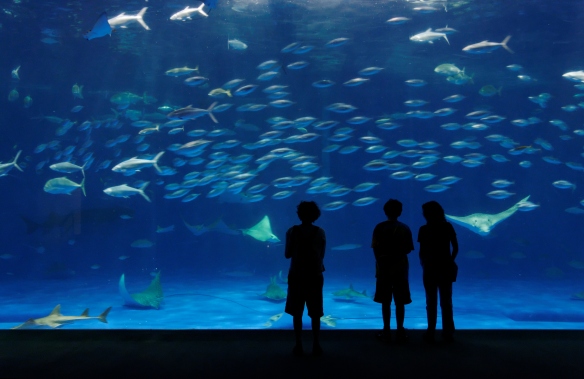
The vision shifts. Zen landscapes,


crowded city streets with tall buildings,

monks in yellow,

geishas in colorful kimonos,

salarymen in somber business suits all kaleidoscope through the dream. A few exquisite pieces of lacquer ware and a hand painted folding screen decorate a small space.

Yoshiko and Erik sit at a table across from an old Japanese couple with gentle smiles and parchment paper skins. The four of them drink tea. In the next scene they lie asleep in blankets on spotless tatami mats.
All four open their eyes as the light wood of the house splinters into match sticks. They look shocked in Ronnie’s direction – and the dream blows apart.
The ground stops convulsing and a gigantic wave with the salt of a billion tears engulfs the collapsed dwelling. Fires burn as poisons spill out into the land, air and waters.
It’s absolute devastation as far as the eye can see, whether on site or from across space and time. Ronnie sees the word TEPCO but has no idea what it means. A disaster is on the way, and her friends and every soul within hundreds of kilometers are doomed to die. Whether the death of one person or ten thousand, the outcome is unchangeable.
This dream of Japan contains only destruction of life and property and an aftermath that will linger, terrible, for generations. She can imagine what poisons are released; she can imagine, but she doesn’t want to.
***
Ronnie wept in great gasps and needed long minutes to convince herself that she wasn’t in the dream earthquake. All the same, she’d experienced a tsunami of the soul.
A disaster was going to strike northern Japan. What the hell could she do with the information, call the Prime Minister and warn him that he needed to put Japan on high alert? Contact TEPCO, whoever or whatever they were? Could she warn Yoshiko and Erik not to move, or to bring Yoshiko’s aged parents to them instead? She had nightmares for weeks.
Ronnie acknowledged the vision’s finality with a heavy heart. She went to going away parties and contributed to the fund for Yoshiko’s retirement present. She took part in the long goodbye with a smile whenever they met, knowing the parting would be final. When they left for Fukoshima, their absence felt like they were already dead.
That early farewell to Erik and Yoshiko pushed her into a deeper process of farewells. Ronnie was detaching more and more, from everybody and everything. She couldn’t be sure when the next person she knew would show up in a vision.
***
– from my chapter “Precognitious” in Tsunami Cowboys. Available online at amazon.com, amazon.de, and amazon in countries everywhere. This link gets you there.
Uwe’s photos of our trip to Japan and his photography may be viewed at viewpics.de.
Madeira’s Verticals
I laugh and say I’m a travel tramp. A new place to see? How soon can we leave? After a holiday is really just the break before the next trip. But a few months ago I was working very very hard to finish my second novel. In my family we’re One-Tracks, and when we’re focused on a project the outside world vanishes. For the first time in our marriage, this year Uwe had to bribe me to go on vacation….
“How about a week on Madeira?” he suggested. “You can write while we’re there. What do you say to a working holiday?”
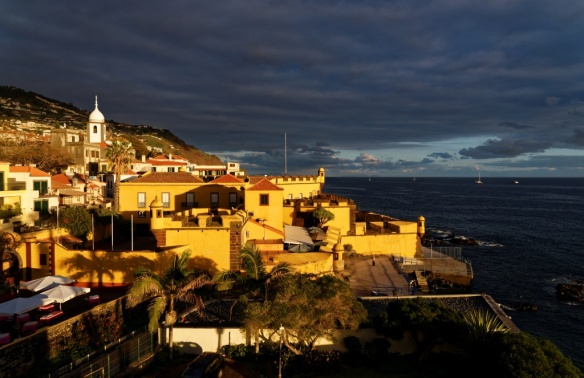
We were on the island a decade ago, and I liked the idea of returning. A place has a personality. You just can’t talk about the Greek islands or the Tunisia coastline without making mention of the quality of light and blue paint contrasting with whitewashed stairs and walls. My visit to Uwe when he was working in northern Sweden was all about snow and the aurora borealis.
Madeira means verticals. This Portuguese possession is located 520 km (280 nautical miles) from the coast of Africa. It’s lush. Madeira advertises itself as the garden island, and it’s a paradise of vivid flowering plants and trees.

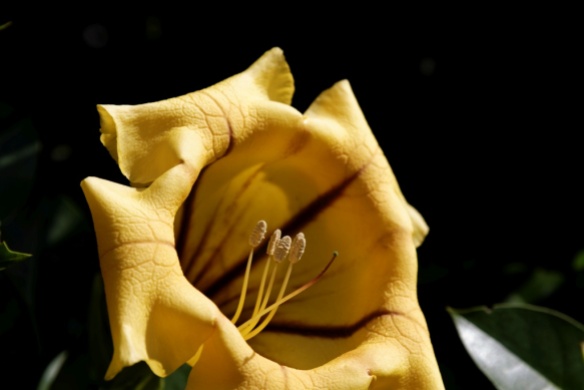 Madeira is also impossibly steep.
Madeira is also impossibly steep.

We took the cable cars from the capitol of Funchal up to the various parks and botanical gardens. Later we rented a car and went exploring. Achadas da Cruz (Porto Moniz), population 159, on the northwest corner was a delightful highlight. The fields are down on the waterfront. To reach them the farmers use the cable car known as teleférico, a descent of 500 meters or over 1,500 feet. Prior to the opening of the teleférico in 2004, they made a steep hike of 5 kilometers down to their fields. Now, that’s dedication!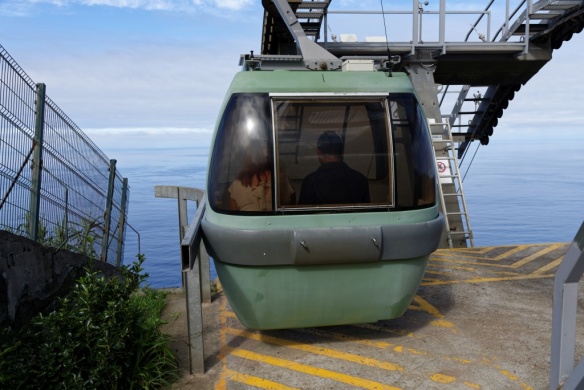

While the teleférico is popular with tourists and costs only 3€ for a one-way trip, the cable car really is used by farmers to transport crops.
Madeira was voted Europe’s Leading Island Destination in 2013. There are ample opportunities for hiking along the traditional water canals known as levadas. The island’s famous for Madeira wine, forests of bay laurels, and black scabbard fish.

The black scabbard or Espada Preta is one ugly fish. It is found only in extremely deep waters like those of Madeira’s coastline. The fish are abundant in waters between 800 and 1300 meters deep; adult fish swim at depths of 200-2000 metres and easily live and feed at substantially greater depths. Almost nothing is known about its life cycle!
A dish of black scabbard and bananas is the island meal (it’s okay. We preferred the fish cooked other ways: with garlic and wine, or in a fish soup, or…) The fish has no scales, and the delicate flesh melts in your mouth no matter how it’s prepared.
Bom Proveito!
NOTES: All photogaphs can be enlarged by simply clicking on the image. More of Uwe’s pictures from Madeira and his photography may be viewed at viewpics.de. For more on the One-Tracks go to: Meet the One-Tracks. Northern Sweden: It Was a Bitterly Cold -22°. My new novel: Tsunami Cowboys.




